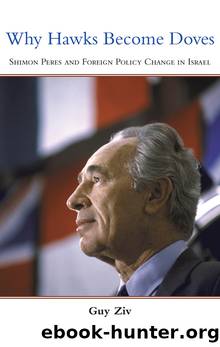Why Hawks Become Doves: Shimon Peres and Foreign Policy Change in Israel by Guy Ziv

Author:Guy Ziv [Ziv, Guy]
Language: eng
Format: epub
ISBN: 9781438453958
Goodreads: 22150935
Publisher: State University of New York Press
Published: 2014-12-01T00:00:00+00:00
Support for a Palestinian State
If it took many years for Israeli policymakers to recognize, and agree to negotiate with, the PLO, it took even longer for them to accept the notionâpublicly, at leastâof an independent Palestinian state. While today even rightist prime ministers such as Benjamin Netanyahu have endorsed Palestinian statehood, this was certainly not the case in the 1990s. This sea change in attitudes can be traced to the direct negotiations with the PLO begun in Oslo. It was only in May 1997 that the Labor Party, no longer in power, formally resolved to accept a Palestinian state (Ben-Ami 2006, 247). At the Sixth Labor Party Convention, which took place on December 7 of that year, Labor Party chairman Peres expressed his support for a Palestinian state âbecause we cannot carry on our shoulders the economic and social responsibility of three million Arabs, because they are authorized to conduct their lives and say so in a loud and clear voice.â18
Prior to the late 1990s, however, neither Peres nor Rabin, whose peace efforts led to his assassination by a right-wing extremist in November 1995, expressed support for a Palestinian state. In his televised debate with Shamir on the eve of the 1992 elections, Rabin emphasized that there were three points about which he stood firm: âno to a Palestinian state, no return to 1967 borders and a united Jerusalem under Israeli sovereigntyâ (Lochery 1997, 214). Following the Oslo breakthrough, however, both Rabin and Peres danced around this delicate issue. On the one hand, they were careful to continue to publicly oppose a Palestinian state so as not to prejudge the outcome of the ongoing negotiationsâand, perhaps just as importantly, to keep their fragile coalition intact. On the other hand, their opposition to a state did not appear to be nearly as firm as it had been prior to Oslo. Rabin, when asked about his position on this matter, responded in a convoluted manner:
Whoever reads the Labor partyâs election platform will find that there is no support for the establishment of a Palestinian state. However, it should be recalled that the permanent settlement will only be discussed in two yearsâ time, or not later than another two years, when we will have had an opportunity to examine two stagesââGaza and Jericho First,â and afterwards stages connected with the transfer of authority, perhaps even elections in all the territoriesâwhat the level of the Palestinian systemâs capability will be to govern in those spheres which, according to the agreements, have been or will be given to them to govern. (Israel Radio 1994)
Peres, too, expressed opposition to an independent Palestinian state, but did not rule it out. In one interview, Peres was asked if the Palestinians would be given a state of their own, to which he responded: âNo, we would prefer to see the solution as a Jordanian-Palestinian confederation which will leave the West Bank and Gaza demilitarizedâ (CNN 1993). In his book The New Middle East, penned shortly after the historic events
Download
This site does not store any files on its server. We only index and link to content provided by other sites. Please contact the content providers to delete copyright contents if any and email us, we'll remove relevant links or contents immediately.
The Secret History by Donna Tartt(19086)
The Social Justice Warrior Handbook by Lisa De Pasquale(12190)
Thirteen Reasons Why by Jay Asher(8909)
This Is How You Lose Her by Junot Diaz(6886)
Weapons of Math Destruction by Cathy O'Neil(6279)
Zero to One by Peter Thiel(5801)
Beartown by Fredrik Backman(5754)
The Myth of the Strong Leader by Archie Brown(5507)
The Fire Next Time by James Baldwin(5442)
How Democracies Die by Steven Levitsky & Daniel Ziblatt(5218)
Promise Me, Dad by Joe Biden(5153)
Stone's Rules by Roger Stone(5087)
A Higher Loyalty: Truth, Lies, and Leadership by James Comey(4962)
100 Deadly Skills by Clint Emerson(4925)
Rise and Kill First by Ronen Bergman(4788)
Secrecy World by Jake Bernstein(4753)
The David Icke Guide to the Global Conspiracy (and how to end it) by David Icke(4717)
The Farm by Tom Rob Smith(4507)
The Doomsday Machine by Daniel Ellsberg(4490)
